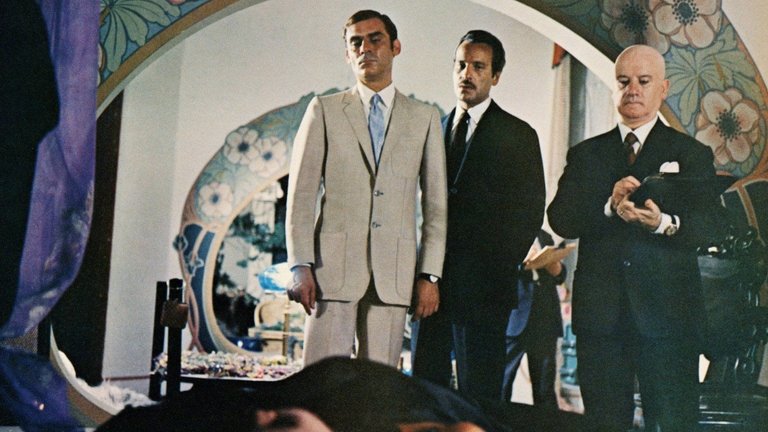Film Review: Investigation of a Citizen Above Suspicion (Indagine su un cittadino al di sopra di ogni sospetto, 1970)

The early 1970s marked a zenith for politically charged European cinema, particularly in Italy, where filmmakers dissected the rot festering beneath the Christian Democrat-led First Republic with surgical precision. From Francesco Rosi’s investigative exposés to the absurdist satire of Dario Fo, Italian auteurs transformed national disillusionment into art. Yet few works captured the era’s paranoia and institutional decay as blisteringly as Elio Petri’s Investigation of a Citizen Above Suspicion (1970), a psychological thriller that merges Kafkaesque bureaucracy with searing social critique. A Palme d’Or winner and Oscar triumph, the film remains a masterclass in political cinema—a chilling reminder of power’s corrupting allure and the fragility of justice in a society teetering between democracy and authoritarianism.
Written by Petri and Ugo Pirro, the script is a prescient reflection of Italy’s descent into political violence. The unnamed protagonist (Gian Maria Volonté), a recently promoted head of Political Office of Rome’s Police, embodies the state’s paradoxes: a man entrusted to combat extremism, yet himself a monster of unchecked authority. In a bravura opening sequence, he murders his lover Augusta Terzi (Florinda Bolkan) during a sadomasochistic tryst, slashing her throat. Her transgressive allure—aroused by his grisly tales of murder—mirrors his own pathological relationship with power: dominance as eroticism, control as ideology.
Volonté’s “Il Dottore” (The Doctor) is no mere villain but a symbol of systemic malignancy. Having led investigations for years, he plants evidence implicating Augusta’s estranged gay husband (Mario Foschi) and Antonio Pace (Sergio Tramonti), a young anarchist and her lover, in her death. Yet his true aim is not evasion but hubristic validation: later he deliberately leaves clues pointing to himself, daring the state to indict its own enforcer. The investigation becomes a perverse game, exposing not just his guilt but the judiciary’s complicity. Colleagues dismiss evidence, witnesses are coerced, and dissenters tortured—all to preserve the myth of institutional infallibility. Petri’s genius lies in framing this not as aberration but routine, a bureaucracy where fascist-era tactics endure under democratic veneers.
A committed Marxist, Petri trains his ire not on Italy’s right-wing politicians but the unearthed machinery propping them up: the police, judiciary, and security apparatus. Volonté’s Dottore, a careerist who boasts of “purifying the state,” personifies this shadow governance. In chilling monologues, he extols the virtues of torture and sneers at due process. His colleagues, meanwhile, employ Orwellian tech—early computers cataloguing dissidents, wiretaps silencing critics—to sanitise repression.
Yet Petri avoids didacticism, leavening the nihilism with caustic humour. A subplot involving the Dottore’s sycophantic subordinate (Aldo Rendine), who disowns his Communist cousin to curry favour, skewers the moral compromises fuelling authoritarianism. Even sharper is the segment featuring plumber (Salvo Randone) whom Dottore confesses the crime and instructs to report him to police. His terrified retreat—realising the Dottore’s identity—epitomises the citizenry’s complicit silence. Ennio Morricone’s score amplifies this irony, juxtaposing discordant strings to underscore the farce of “justice.”
The film’s corrosive power rests on Gian Maria Volonté’s titanic performance. Best known as spaghetti western villains, Volonté here crafts a more insidious evil: a bureaucrat whose banality masks bottomless depravity. With reptilian poise, he oscillates between icy control—lecturing underlings on “the art of interrogation”—and sweaty desperation as his god complex unravels.
Volonté’s Dottore is no cartoon fascist but a disturbingly recognisable archetype: the careerist who conflates duty with sadism, loyalty with obedience. His charm—seductive smiles, paternal pats on the back—makes the tyranny palatable, even to victims. When he grovels before superiors, begging for validation, Petri unveils the cowardice beneath the cruelty. It’s a career-defining turn, blending intellect, menace, and pathos to humanise inhumanity.
Released amid the aftershocks of 1968’s global unrest, Investigation struck a nerve. Critics lauded its daring, awarding it the Cannes Grand Prix and an Oscar. Yet the film’s flaws, while minor, linger. Petri’s grip slackens in the final act, as the Dottore’s meltdown veers into expressionist excess. The climax feels unmoored from the prior realism, its surrealism clashing with the script’s surgical precision. Volonté’s descent into madness, though visceral, risks diluting the critique into melodrama.
Half a century on, Investigation’s relevance has only deepened. Petri’s vision of a state weaponising technology, media, and legalism to shield its crimes anticipates modern authoritarianism—from algorithmic surveillance to “fake news” gaslighting. The Dottore’s heirs thrive in regimes where impunity is codified, dissent pathologised, and truth negotiable.
Yet the film’s true triumph is its refusal to console. There’s no heroic whistleblower, no eleventh-hour reckoning. The Dottore’s superiors, recognising his utility, bury the scandal—a finale as bleak as it is plausible. In this, Petri’s masterpiece transcends its era, offering not just a portrait of 1970s Italy but a universal fable of power’s corruption. As institutions worldwide erode under cynicism and graft, Investigation stands as both elegy and alarm: a reminder that the citizen above suspicion is rarely innocent, and never alone.
RATING: 7/10 (+++)
Blog in Croatian https://draxblog.com
Blog in English https://draxreview.wordpress.com/
InLeo blog https://inleo.io/@drax.leo
Hiveonboard: https://hiveonboard.com?ref=drax
InLeo: https://inleo.io/signup?referral=drax.leo
Rising Star game: https://www.risingstargame.com?referrer=drax
1Inch: https://1inch.exchange/#/r/0x83823d8CCB74F828148258BB4457642124b1328e
BTC donations: 1EWxiMiP6iiG9rger3NuUSd6HByaxQWafG
ETH donations: 0xB305F144323b99e6f8b1d66f5D7DE78B498C32A7
BCH donations: qpvxw0jax79lhmvlgcldkzpqanf03r9cjv8y6gtmk9